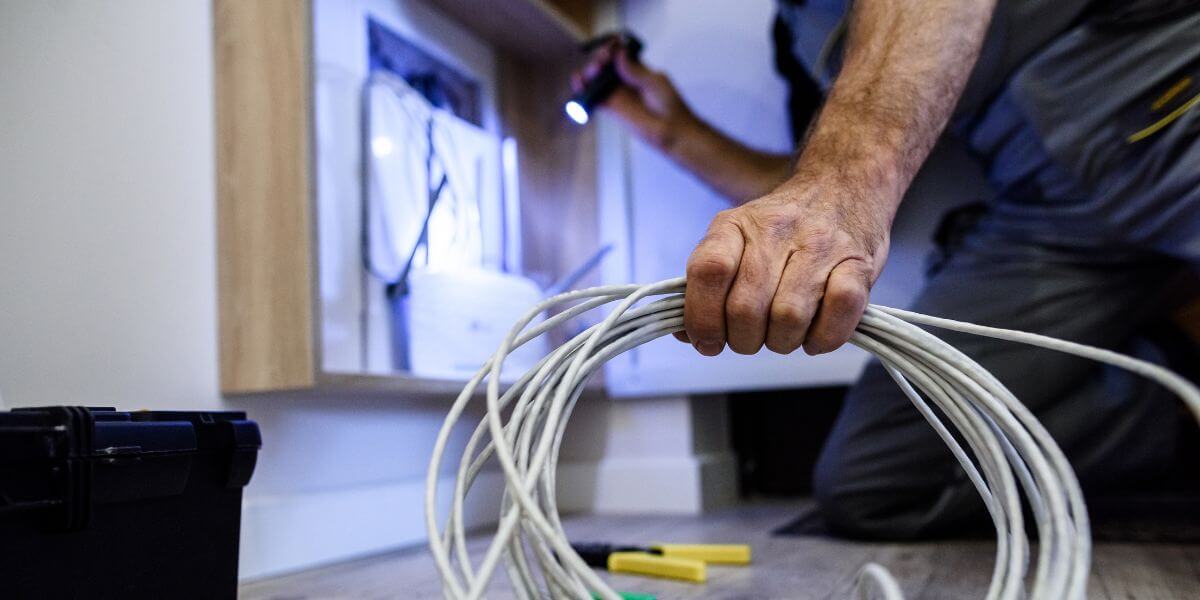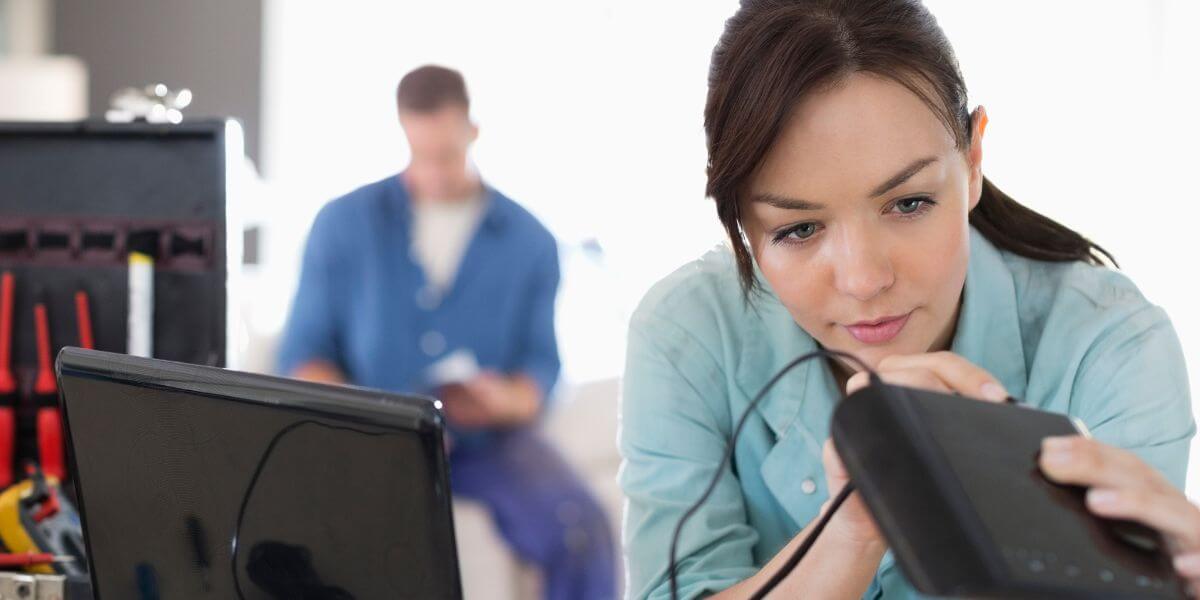Lower your internet bill
61% of people overpay for their internet.
Are you one of them?
Unlock exclusive offers in your area!
Call now
[tel]Enter zip code
1 Star is Poor & 5 Stars is Excellent.
* Required
Written by Sam Watanuki - Pub. Sep 15, 2025 / Updated Sep 14, 2025
Table of Contents
Are you happy with your Internet service?
About the author
Getting a new internet set up can be a headache. Between booking technician appointments, wrestling with messy cables, and paying extra fees on top of your already pricey bill, installation often feels like the worst part of the process. But it doesn’t have to be. The right provider can make setup simple, offering perks like free installation or easy-to-use self-install kits that get your Wi-Fi up and running without the stress.
Over the past decade, internet providers have recognized that complex installation processes drive customers away. Major companies have invested heavily in simplified setup procedures, with many now offering plug-and-play solutions that take minutes rather than hours. According to the Federal Communications Commission’s 2024 Broadband Deployment Report, more new internet installations now use simplified setup processes than ever before [1].
When you compare internet providers, installation convenience should be a top priority alongside factors like speed and pricing. The best internet providers understand that even the most affordable internet plans lose their appeal when installation becomes a headache. Let’s explore which companies make easy internet installation as painless as possible.
61% of people overpay for their internet.
Are you one of them?
Unlock exclusive offers in your area!
Call now
[tel]Enter zip code
Internet installation has evolved significantly from the days when technicians needed to run new cables through walls and spend entire afternoons setting up equipment. Today’s streamlined processes typically fall into three categories:
The shift toward easier installation reflects changing consumer expectations. A 2024 study by J.D. Power found that installation experience directly impacts customer satisfaction scores, with providers offering streamlined setup processes receiving higher satisfaction ratings than those requiring complex professional installation [2].
T-Mobile 5G Home Internet stands out as the easiest internet option to install because it requires no cables, no technician visits, and no special wiring in your home. This wireless internet service uses cellular tower signals to deliver broadband speeds directly to a gateway device.
Installation is completely free and takes about 15 minutes. T-Mobile ships you a gateway router along with your account information, and setup involves simply plugging the device into a power outlet and following the app-based setup instructions. The service costs $50 per month with AutoPay, making it one of the most affordable internet options available [3].
The wireless approach works particularly well for renters who can’t modify their living space or homeowners in areas where traditional cable installation would be complex or expensive. T-Mobile’s coverage has expanded rapidly, with the company reporting that their 5G home internet now reaches over 50 million households as of late 2024.
To get T-Mobile 5G Home Internet, check availability at your address on their website, sign up for service, and wait for your gateway to arrive in the mail. No technician appointment necessary.

Best free installation: Xfinity
Xfinity dominates the self-installation space by making their DIY kits the default option for new customers. As one of the largest internet providers in the country, Xfinity has perfected the art of shipping everything customers need to get online without professional help.
Their self-installation kit includes an Ethernet cable, coaxial cables, and a gateway router that combines modem and Wi-Fi functions. The kit arrives within 3-5 business days, and Xfinity’s mobile app guides you through the setup process step-by-step. While you’ll pay a monthly rental fee for the gateway equipment, the installation itself is completely free.
Xfinity serves as an excellent option for budget-conscious customers seeking cheap internet plans without installation fees. Their cheapest plans start around $55 per month for new customers, and the self-installation option helps keep total first-month costs low [4].
While AT&T Fiber charges $99 for professional installation, the company often waives this fee for new customers, certain plans, or as part of promotional deals [5]. Professional installation makes sense for fiber internet because the technology may require new wiring connections from street utility boxes to your home.
AT&T’s fiber network offers some of the fastest speeds available, with plans reaching up to 5 Gigabits per second in select markets [6]. The professional installation ensures optimal performance and includes setup of AT&T’s gateway equipment or configuration of your own compatible router.
If your home already has fiber wiring, AT&T may offer self-installation as a free alternative. The company determines eligibility during the signup process and provides guidance on which installation method works best for your situation.
AT&T also frequently runs promotions that include installation credits or prepaid Visa cards to offset setup costs, making their service more competitive with cheap internet providers that emphasize free installation.

Best customer experience: Verizon Fios
Verizon consistently ranks at the top of customer satisfaction surveys, earning recognition from J.D. Power and the American Customer Satisfaction Index for reliability and service quality [7]. Their installation process reflects this commitment to customer experience.
Verizon charges $99 for professional Fios installation, but this fee is often waived for promotional periods, specific plans, or certain service areas [8]. Professional installation typically takes 4-6 hours and includes comprehensive setup of fiber equipment and Wi-Fi configuration.
For homes already wired for fiber, Verizon offers self-installation kits available through mail delivery or pickup at Verizon stores. The installation instructions are accessible through your My Verizon account, and customer service provides phone support throughout the process.
Verizon’s 5G Home Internet service offers an even simpler installation experience similar to T-Mobile’s approach. Customers receive a gateway device by mail and complete setup using the My Verizon app.
The company’s customer service excellence makes them particularly valuable for customers who may need technical support during or after installation. Verizon’s support team can troubleshoot connection issues and optimize network performance remotely.
Astound Cable has built a reputation for offering extensive promotional deals that include free installation coupons, discounted setup fees, and bundled service savings. These promotions make Astound competitive among the best cheap internet providers despite being a smaller regional company.
Astound’s promotional offers change regularly and vary by service area, but consistently include options for waived installation fees when customers use specific coupon codes during signup. The company serves select markets primarily in California, Texas, and other western states.
To take advantage of Astound’s deals, visit their website and look for location-specific promotion codes before completing your order. The installation appointment scheduling process allows flexible timing that works around your schedule.
When comparing internet plans, consider these factors to determine which installation approach works best for your needs:
The best internet providers offer flexibility in installation options, allowing customers to choose the approach that fits their budget, schedule, and comfort level.

Making installation day successful
Whether you choose self-installation or professional setup, preparation helps ensure a smooth experience:
For self-installation, clear the area around your modem/router location, have your account information readily available, and download your provider’s mobile app before starting. Most companies provide customer support phone numbers specifically for installation assistance.
For professional installation, ensure technician access to relevant areas of your home, locate existing cable/phone jacks, and prepare a list of questions about your new service. Professional installers can optimize Wi-Fi placement and explain equipment features during their visit.
Enter your ZIP code here to see all available internet options in your neighborhood.
Self-installation usually takes 15-30 minutes for wireless services and 30-60 minutes for cable internet. Professional installation ranges from 2-6 hours depending on whether new wiring is required. Most self-installation issues can be resolved within an hour with customer support assistance.
Yes, modern self-installation kits are designed for non-technical users. Providers include detailed visual instructions, and many offer mobile apps that guide you through each step. Customer support is available by phone if you encounter difficulties. If self-installation doesn’t work, most companies will send a technician at no additional cost.
Most internet providers offer free technician visits if self-installation fails through no fault of the customer. Contact customer support for troubleshooting assistance first, as many connection issues can be resolved over the phone. If a technician visit becomes necessary, providers typically waive the service fee for customers who initially attempted self-installation.
Common additional costs include equipment rental fees ($10-15/month for modems/routers), activation fees ($25-50), and potential early termination fees if you cancel service early. When comparing internet providers, ask for a complete breakdown of all monthly and one-time fees to avoid surprises on your first bill.
[1] FCC. “FCC Increases Broadband Speed Benchmark."
[3] T-Mobile. “T-Mobile 5G Home Internet."
[4] Xfinity. “Internet Service Offerings."
[5] AT&T. “AT&T INTERNET Fee Schedule (Consumer)."
[6] AT&T. “Intenet Service Plans."
[7] Yahoo! “Verizon Delivers a one-two punch with Best Wireless Network Performance results"
About the author
Congratulations, you qualify for deals on internet plans.
Speak with our specialists to access all local discounts and limited time offers in your area.
[tel]61% of people overpay for their internet.
Are you one of them?
Unlock exclusive offers in your area!
Call now
[tel]Enter zip code